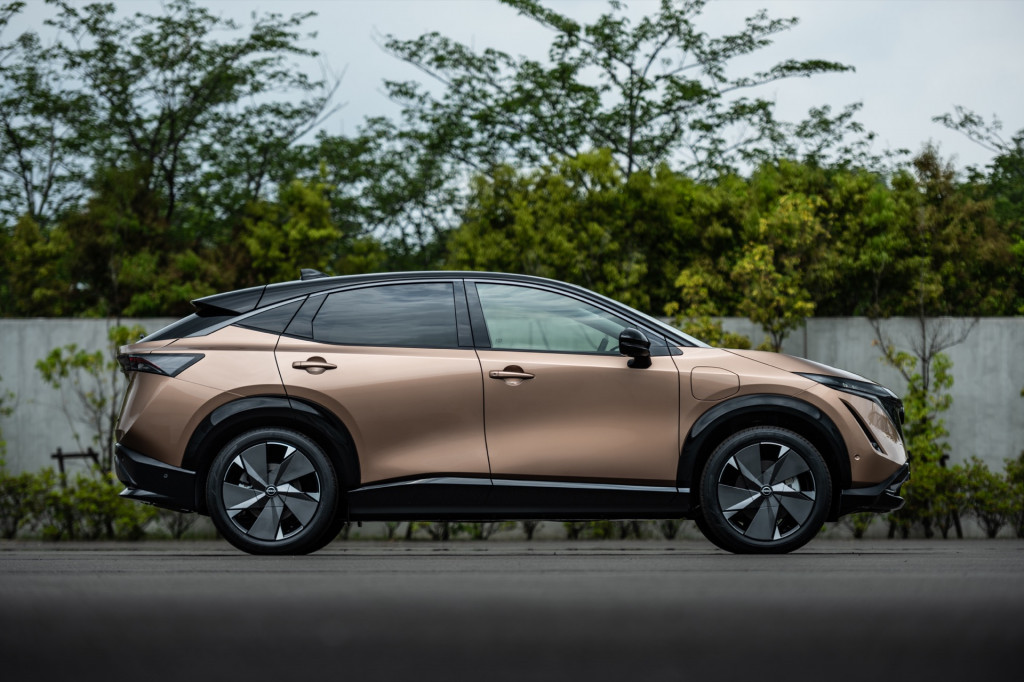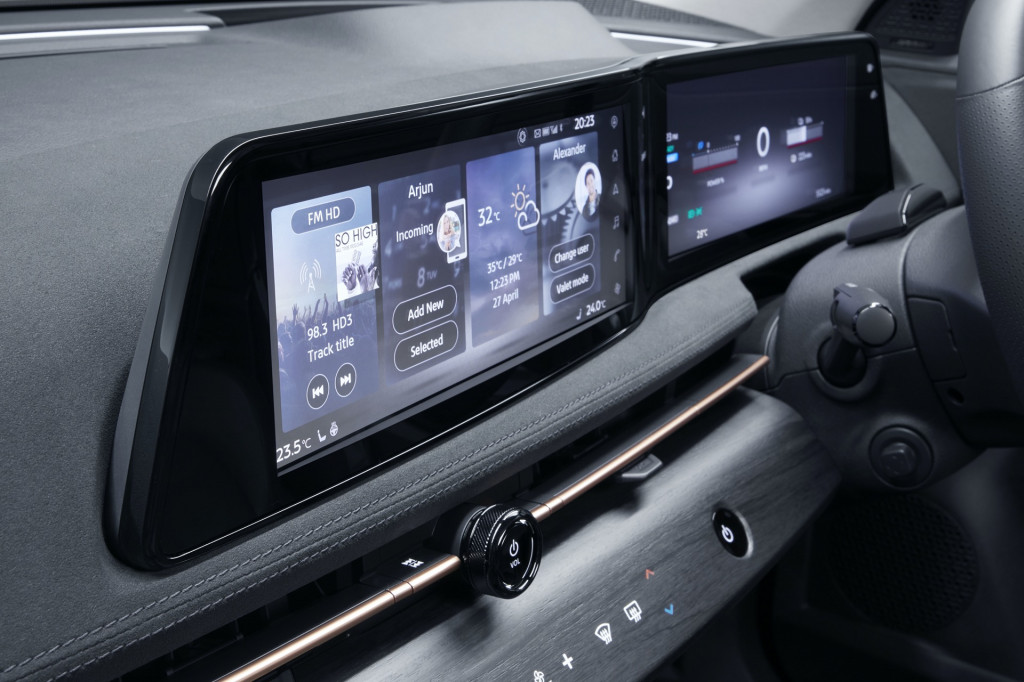The production-bound Ariya electric crossover that Nissan revealed Wednesday morning in Japan represents a bucketload of firsts for the brand.
First and foremost to Nissan, the Ariya is at the leading edge of a strategy that involves all-new vehicles and significant updates for most of the automaker’s vehicles in the next couple of years.
The 2022 Nissan Ariya is also the first of many upcoming global electric vehicles—including some from Infiniti, Mitsubishi, and Renault—to be built on Nissan’s global modular platform for EVs, and has a clean-slate approach that doesn’t carry over pieces of the Leaf.

Nissan IMx concept, 2017 Tokyo Motor Show
The crossover was first hinted at with the IMx concept from the 2017 Tokyo Motor Show, and then shown in Ariya concept form—very close to production form—at the 2019 Tokyo show.
Surprisingly little has changed in the Ariya’s trajectory from concept to production, and that’s a good thing. Nissan has carried through the same futuristic, coupe-like form; it’s targeting 300 EPA-rated miles for the larger of two batteries (90 kwh, versus 65 kwh); twin-motor all-wheel-drive models will offer a clever e-4orce system that interlaces stability controls and motor controls; and the Ariya will offer ProPilot Assist 2.0, which is more akin to Tesla’s Navigate on Autopilot in its present form.
Official outputs will vary from 215 to 389 horsepower, and from 221 to 443 pound-feet of torque, respectively. Executives have hinted that 0-60 mph times will clock around 5.0 seconds.
Pricing starts around $40,000 for the U.S., with the smaller battery. The larger battery and e-4orce might add up close to what a dual-motor Model Y costs prior to credits or incentives, but Nissan has enough U.S. EV sales left before hitting the federal EV tax credit's 200,000 trigger to assure that many Ariya buyers will get the full $7,500 amount.

Nissan Ariya
In the U.S., the Ariya will compete with electric crossovers such as the Tesla Model Y, the Volkswagen ID.4, the Volvo XC40 Recharge, and the Ford Mustang Mach-E—all of which are in the vicinity of its 182.9-inch length and 109.3-inch wheelbase. It will arrive here in the second half of 2021, after a mid-year 2021 arrival in Japan. European deliveries will follow.
To save you more than top-level spec rehash and give you a better idea of whether you might want to abandon your order on one of these other models, we caught up with Nissan executives ahead of the reveal: Ivan Espinosa, Nissan’s senior VP for global product planning, and Alfonso Albaisa, the senior vice president for global design. With them, we homed in on some key points of differentiation for the Ariya as the competition heats up.
Yes, the battery is liquid-cooled. Espinosa confirmed that the battery is liquid-cooled and that Nissan has a new thermal management system for it. From nearly half a million Leafs in ten years, he said that “there’s a lot of learning there in terms of durability, battery behavior, and safety.”
Nissan Ariya
Nissan is jumping fast-charging formats. The Ariya will offer CCS in the U.S. and Europe, but will stick to CHAdeMO in Japan. The short of it: Standards are evolving, and the automaker just wants to make EV adoption easiest for customers. More on this soon!
The peak charging rate is in the 150-kw league. Charging times are yet to come, but they sound very competitive. The Ariya can charge up to 137 kw, according to Espinosa, who after a pause added, “for now.” Sounds like it might get faster in the future?
Nissan Ariya
Nissan is using a very high amount of usable capacity. Nissan might be second only to Tesla in the percentage of gross capacity it’s actually using—63 out of 65 kwh for its smaller pack, and 87 out of 90 kwh for its larger one.
Espinosa credited the confidence it has, and the learning and experience it has with Leaf packs. Secondly, it’s remaining conscious of the idea of managing and optimizing the energy you actually put in the car. “Because each kilowatt hour is a lot of money, so you need to be very, very efficient and effective,” he said.

Nissan Leaf e-4orce demo - Las Vegas Motor Speedway, January 2020
AWD versions will use know-how from the GT-R supercar. With the e-4orce system, which we sampled in a Leaf test mule earlier this year, dual-motor Ariyas will be ”bringing the vehicle motion control to the next level,” and incorporate much of the company’s experience with GT-R, executives note.
Why front-wheel drive makes more sense than rear-wheel drive for single-motor models. Nissan seemed ready for this one. First, the Ariya is a family car, and front-wheel drive is easier to drive on the snow. Secondly, there are advantages in the packaging, and a greater sense of roominess by prioritizing components at the front of the vehicle. Thirdly, with a rear-wheel-drive car as a base model, you’re carrying a lot of unnecessary costs through the entire model line in wiring harnesses and such that need to run the whole length of the vehicle.

Nissan Ariya

Nissan Ariya

Nissan Ariya
Single-motor versions have more cargo space, too. Apparently Nissan has packaged the single-motor Ariya so efficiently that adding the rear motor raises the cargo floor; the all-wheel-drive model has 14.9 cubic feet with the back seat up, as opposed to 16.5 cubic feet. Cheers to another advantage of making single-motor models front-wheel drive.
Leaf learnings, but not Leaf-derived. With more than 475,000 Leafs sold, Nissan has a lot of experience to draw from—selling, supporting, and updating its Leaf hatchback over the years, and seeing how customers use the Leaf. And while it wanted to be clear that it drew from that as a starting point, Nissan started Ariya “with a white canvas.”

Nissan Ariya
Magic-carpet interior, Dali-esque interface. “When you open the door in a normal car, you have a huge center console, every space is divided, and you don't get this open feeling,” said Albaisa. But using the very low floor afforded by the modular platform, with the climate control pushed ahead under the hood, Nissan freed up floor space to make it spacious and lounge-like. The whole center console even moves back and forth.
Albaisa is also proud that the concept’s simplified glass, single-piece interface that lets the driver’s eyes pan from side to side, from the infotainment screen to the gauge cluster—"this Salvador Dali melted-clock bend”—made it to production.

Nissan Ariya
Nissan wants Ariya to be seen as the tech flagship, not the powertrain choice. According to Espinoza, the Ariya harmonizes advanced technology such as the all-electric layout, e-4orce all-wheel-drive system, driving assistance, and interface in multiple ways. According to Espinoza, Ariya “is the icon of Nissan Intelligent Mobility and it’s really displaying and portraying all the key technologies that we are preparing for the future in our lineup, not only in this car.”
And when you consider the self-parking system and the sci-fi-influenced sound the Ariya makes in the video below—something we didn't get the chance to ask about—the goal is at least partly to broaden horizons and show that almost everyone can enjoy geeking out on zero-emissions tech.
